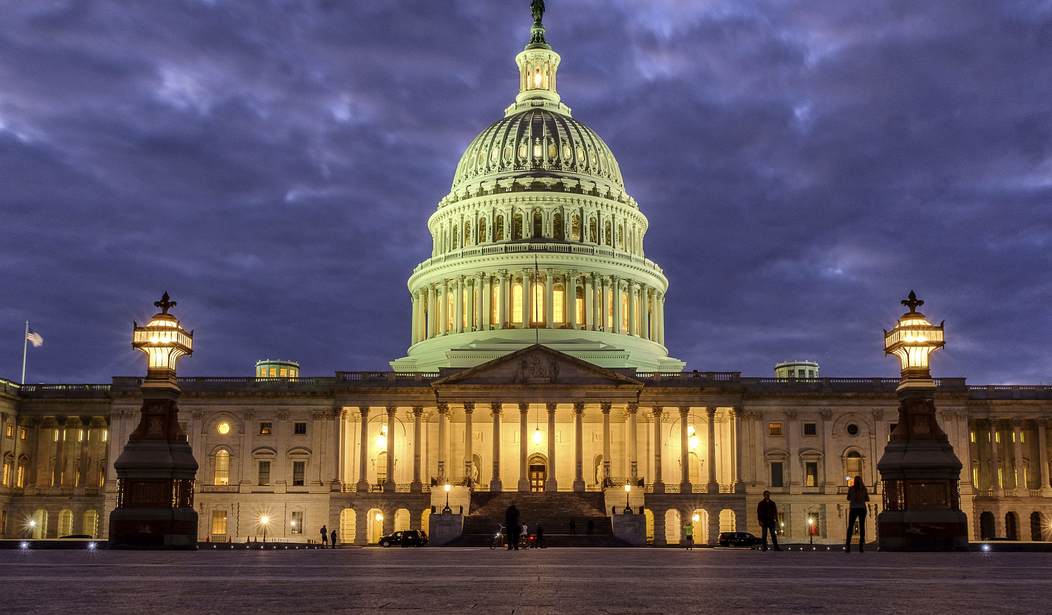A very happy Chuck Schumer went down to the Senate floor on Monday to brag about the deal he had cut on federal spending with Republican House Speaker Mike Johnson.
"First, I have excellent news on government funding," Schumer said.
"Yesterday, I announced with Speaker Johnson that congressional leaders have reached a top-line agreement for government funding for the 2024 fiscal year," he said.
"When we began our negotiations, our goal was to preserve a nondefense funding level of $772 billion -- the same level agreed to in our debt ceiling deal last June," he said. "That $772 billion was precisely the number we reached. Not a nickel was cut."
"Both parties reached this agreement without resorting to the painful and draconian cuts that the hard right -- particularly those in the Freedom Caucus -- clamored for," said Schumer.
Schumer then warned that the Republican-controlled House better not include what he called "poison pills" in the appropriations bills that Congress must now approve.
"Of course, our work must continue," said Schumer. "Producing 12 appropriations bills will not be easy. It is going to require agreement from the four corners and a lot more compromise between the parties.
"And make no mistake -- Democrats have made clear to Speaker Johnson that we will not support the inclusion of any poison pills in any of the 12 appropriations bills before the Congress," Schumer said.
What has federal spending looked like in recent years?
Back at the beginning of this century, in fiscal 2001, the federal government spent $1,863,909,000,000 -- and actually ran a surplus of $127,021,000,000.
Recommended
The $1,863,909,000,000 that the federal government spent that year equals $3,209,843,650,000 in constant November 2023 dollars, when adjusted using the Bureau of Labor Statistics inflation calculator.
By 2019, the year before the COVID pandemic hit, federal spending was $4,446,611,000,000 -- or $5,317,579,340,000 in November 2023 dollars.
The next year, during the pandemic, federal spending rose to $6,551,872,000,000 -- or $7,729,210,270,000 in November 2023 dollars.
Since then, it has never dropped back below $6 trillion. In fiscal 2021, it was $6,821,532,000,000 ($7,635,734,100,000 in November 2023 dollars). In fiscal 2022, it was $6,271,606,000,000 ($6,488,042,420,000 in November 2023 dollars). And in fiscal 2023, it was $6,134,525,000,000.
In every fiscal year since the pandemic, the federal deficit has exceeded $1 trillion. In fiscal 2019, before the pandemic, the deficit was $984,388,000,000. In fiscal 2020, the year of the pandemic, it was $3,131,917,000,000. In fiscal 2021, it was $2,775,553,000,000. In fiscal 2022, it was $1,375,486,000,000.
And, in fiscal 2023, it was $1,695,240,000,000.
In fiscal 2001, federal spending was 17.7% of GDP, according to the historical table published by the White House Office of Management and Budget. In 2019, it was 21%. In 2020, it was 31.1%; in 2021, it was 30.1%; and in 2022, it was 25.1%.
Former South Carolina Gov. Nikki Haley gave a speech last September at St. Anselm College in New Hampshire, where she laid out her economic plan.
"I will veto any spending bill that does not take us back to pre-COVID spending levels," she said. "We're not talking about 1950s spending levels. We're talking about just four years ago. We had a massive -- and in many ways foolish -- explosion in spending during the pandemic. But the pandemic is over. It's absurd to keep spending at those same crazy levels.
"Second, let's place a real limit on what Washington can spend," she said. "Federal spending should not rise to larger percentages of our economy."
Florida Gov. Ron DeSantis gave a speech in New Hampshire in July where he laid out what he called a "Declaration of Economic Independence" that included 10 components. The 10th was: "Fighting Reckless and Wasteful Federal Spending."
"DeSantis will be a new sheriff in town when it comes to spending, and he will not be afraid of using his veto pen," his website says of this commitment. "Our government programs as they exist today are wrought with waste, fraud, and abuse, and continue to be a major drag on our economy, our budget, and the flourishing of our citizens."
The budget proposal that President Joe Biden sent to Congress for fiscal 2024 anticipated (in Table S-1) that the federal deficit would exceed $1.5 trillion every year for the next 10 years. It predicted (in Table S-10) that the federal debt would top $40 trillion in 2027.
During a press briefing on Air Force One on Monday, White House press secretary Karine Jean Pierre echoed Schumer's view of the congressional spending deal.
"The bipartisan funding framework congressional leaders have reached moves us one step closer to preventing a needless government shutdown and protecting important national priorities," she said. "The framework reflects the funding levels negotiated as part of the bipartisan budget agreement and rejects deep cuts to programs hardworking families count on, and it provides a path -- to passing -- full-year funding bills that deliver for the American people and are free of any extreme policies."
What politicians in Washington are delivering now to the American people is an ever-increasing burden of debt.
That must change. America needs leaders who will not just hold the deficit in check but actually eliminate it -- and start paying down the debt.
























Join the conversation as a VIP Member